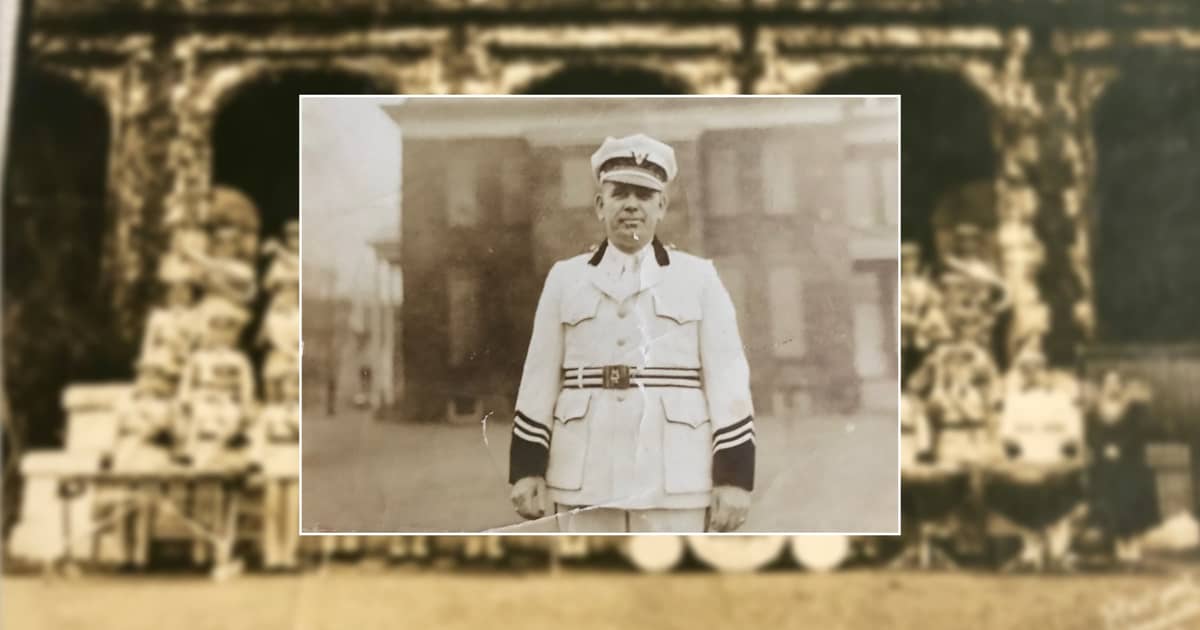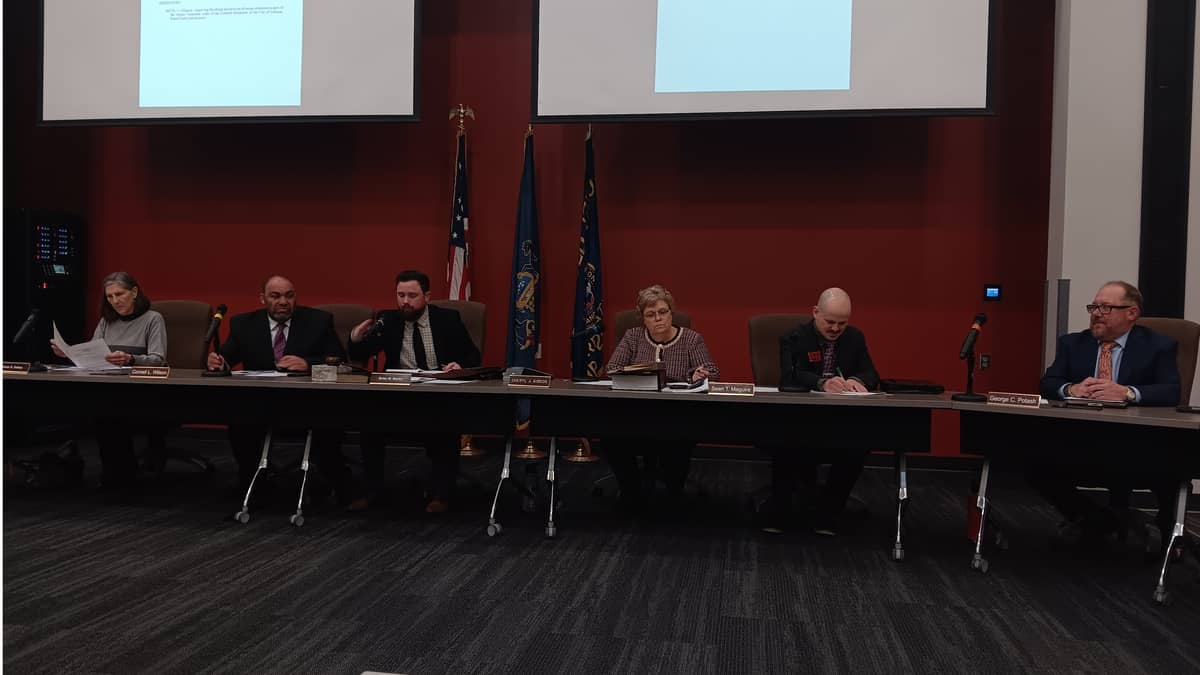A pioneering Lebanon County musician who overcame great loss to become a bandleader of wide local renown will be honored at an upcoming concert by the Washington Band of Annville.
The band nominated its longest-serving director, Joseph “Lem” Carmany, to the Lebanon County Musicians Hall of Fame; he was inducted by the Harmonia Music Association at a May dinner.
The Washington Band will present a concert dedicated to Carmany at 2pm Sunday, Sept. 15, at the Allen Theater, 36 E. Main St., Annville.
Carmany led the band, founded in 1856, from 1906 to 1951. During his tenure, the band doubled in size, going from 21 in a 1908 picture to 44 in a 1940 picture, and became one of the premier town bands of Lebanon County, according to current band director Michael Yeagley.
Yeagley nominated Carmany for induction into the Musicians Hall of Fame. He said there are no complete records of all the directors the band has had, but they’ve all stuck around at the post for quite a while.
Read more: Harmonia Music Association recognizes 2019 class of Lebanon County Musicians’ Hall of Fame
“I do know that we’ve had only six different directors since 1906,” Yeagley said in emailed responses to questions. “In fact, only four of us cover 110 of the last 113 years.”
Joseph Carmany, of Annville, was orphaned at age 2 and was raised in what was then the Loysville Boys Orphanage (later the Tressler Orphans’ Home, then the Tressler Lutheran Home for Children). Debra Forwood Shuey, Carmany’s granddaughter, thinks his parents likely died of influenza.
Shuey, 66, of South Lebanon Township, is a retired laboratory worker at the Hershey’s chocolate factory and an Annville native. She said the orphanage boasted a famous traveling band, the Tressler Orphans’ Home Boys’ Band, and thinks Carmany developed his musical skills at the orphanage and by playing in the band.
Shuey said her grandfather gave her clarinet lessons when she was a child, “and that’s what he did — besides the Washington Band, he gave private lessons,” she said in a phone interview. Carmany also played the clarinet. Two of Shuey’s aunts sang in the band as well.
She said she didn’t know much about her grandfather’s background until now.
“It’s been a good learning experience,” she said. “You didn’t talk about people’s history — we’re Pennsylvania Dutch people. I knew him up until the age of 13, but you never questioned, like what was your childhood like.
“(He and his wife) had 12 children — my mom was one of the siblings — but only five survived. Can you imagine? And I just can’t imagine being an orphan at age 2. From such a horrible beginning to become what he did, I think is a great accomplishment,” she added.
Shuey called her grandfather “quite a character.”
“Food was always important to me, so if I had a good lesson, I got those pink Canadian mints as a treat,” she said. “He would sit right beside you and he would play along with you the entire time of your lesson.”
Shuey shared segments of the program from the Washington Band’s 100th anniversary concert in 1956, which she attended. Carmany served as guest conductor and led the band in five selections, including the first he ever conducted, “The American Eagle March,” by George Cooper. A crowd of 2,000 attended, she said.
“Back in the day, that was the big entertainment in summertime — the band would go to all these different picnic areas and they would have these big concerts,” she said. “I remember being there (at the 100th anniversary concert) and I have the tape of it and the booklet.”

The program notes that Carmany “struggled with a group of young and inexperienced players until he developed a band of more than forty musicians” and added, “we owe him a debt of real gratitude for his courage, patience, and untiring efforts in training this band.”
Carmany died in 1964 at age 80.
“He was buried in his band uniform with his clarinet,” she said. “I remember that.”
Shuey, her sister, and her cousin will attend Sunday’s concert, as will one of Carmany’s former students, who became a gifted musician in his own right.
Col. Jere W. Fridy, a conductor for the Virginia Grand Military Band, played in the Washington Band as an 11-year-old under Carmany’s direction; he also took lessons from Carmany, Shuey said. Fridy was president of the Penn State Blue Band when he attended the university. He served as solo cornetist with the 553rd Air Force Band and later became commander of that band.
Fridy — whom Shuey considers her grandfather’s “star pupil” — spoke to her recently about Carmany. Fridy’s cousin and Shuey’s cousin are friends, which is how the two connected.
“When he found out about (the concert), he was very excited to share,” Shuey said.
He told her Carmany took the Washington Band back to Loysville after he became the conductor and gave concerts at the orphanage.
“He feels (Carmany) is the reason the Washington Band exists to this day, because he was such a great influence on local musicians,” she said. “He also said (Carmany) was the greatest music educator he ever knew. He spoke very highly of him.”
At least two past members of the Washington Band are also in the Hall of Fame, Tim Erdman and Stan Mark, according to Yeagley, and there may be others.
The Washington Band, made up of 42 musicians, performs a variety of music — marches, patriotic songs, movie and Broadway music, polkas, and classical transcriptions for band, to name a few — and prepares about 35 pieces for performance at concerts each year. They had 16 performances on this year’s schedule.
For the Carmany concert, all the music will be from the early 1900s, Yeagley said.
“In fact, several of the pieces were probably purchased and first performed under Carmany’s leadership,” he said. “The main piece is a 1910 band arrangement of the orchestra overture ‘Poet and Peasant’ (by Austrian composer Franz von Suppe). There will be several other lighter numbers, and of course, marches.”
Those will Include what Shuey called Carmany’s favorite march, John Philip Sousa’s “The Stars and Stripes Forever.”
With the Hall of Fame honor and concert, Carmany’s personal motto really rings true.
“He always said, ‘Men may come and men may go, but I’ll go on forever,’” Shuey said. “And in a way, he has.”

























